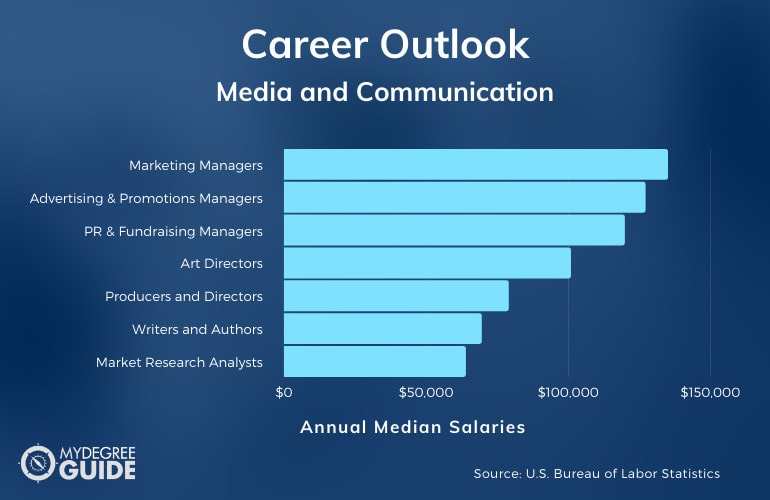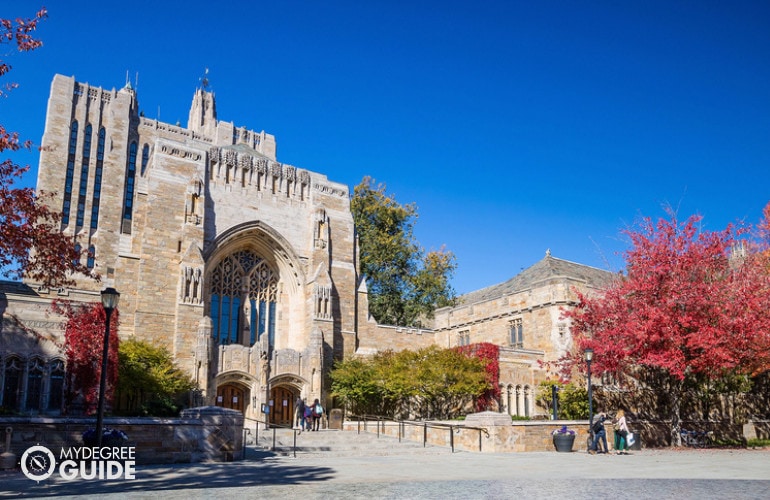Media is one of the largest influences in the world today, and a masters in media studies can enable you to form a critical perspective of media while deepening your research skills.

Whether you’re preparing for an academic or a creative career, a masters in media studies can help you specialize in your interests. Media specialties can range from the impact of technology and culture to video production and game development.
Editorial Listing ShortCode:
After all, media is more widespread now than ever, and there is rising demand for professionals and scholars who have a strategic understanding of media.
Universities Offering Online Masters in Media Studies Degree Program
Methodology: The following school list is in alphabetical order. To be included, a college or university must be regionally accredited and offer degree programs online or in a hybrid format.
Arizona State University
Arizona State University offers a Master of Advanced Study in Film and Media Studies that can be completed fully online. The curriculum consists of 10 courses that are each 7.5 weeks long. The program is designed for students wishing to pursue creative, academic, or consulting roles in the film and media sector. It intends to help students become better equipped to analyze, consume, and communicate in their chosen career field.
ASU is accredited by the Higher Learning Commission.
Brenau University
Brenau University’s Master of Arts in Communication and Media Studies is designed to provide students with the skills necessary to understand and succeed in the media and film industries. This 30 credit multimedia degree online program includes courses in concepts such as communication theory, negotiation and mediation, media globalization, and film theory.
Brenau University is accredited by the Southern Association of Colleges and Schools Commission on Colleges.
Loyola University of Maryland
With online classes and utilization of the latest tools and technology in the field, Loyola University of Maryland’s Master of Arts in Emerging Media program is cutting edge and flexible. Full-time students can typically complete the 33 credits needed to earn their degree in a little over a year, while part-time students have 5 years to finish their curricular requirements.
Loyola University Maryland is accredited by the Middle States Commission on Higher Education.
Lynn University
The Master of Science in Communication and Media – Media Studies and Practice program at Lynn University is designed to teach key concepts in a wide range of media careers. Classes are available online and on campus. They are taught by professors with professional experience, including former international radio and TV reporters, 3D graphics experts, Fulbright scholars, and widely published scholars.
Lynn University is accredited by the Southern Association of Colleges and Schools Commission on Colleges.
Old Dominion University
Old Dominion University’s Master of Arts in Communications – Lifespan and Digital Communication programs aim to help students become innovators in their chosen career fields. Students can choose a concentration in Strategic Communication, Media Studies, or Relationships, Health, and Wellness. To graduate, students must complete a thesis or project catered to their post-graduate career goals.
Old Dominion University is accredited by the Southern Association of Colleges and Schools Commission on Colleges.
Rutgers University
Rutgers University offers a Master of Communication and Media program. It is designed to provide students with the skills needed to excel in rapidly growing, information-intensive fields, such as journalism, communication, public relations, and marketing. The program consists of 36 total credit hours, which can be paced according to students’ needs and taken either online or in-person.
Rutgers is accredited by the Middle States Commission on Higher Education.
Southern Illinois University – Edwardsville
Southern Illinois University—Edwardsville offers a Master of Science in Media Studies. The curriculum stresses a foundation in mass communication theory, qualitative and quantitative research methods, and design, production, and application of media messaging. Whether students choose to complete their degrees online or in-person, either format boasts smaller class sizes and teacher-student ratios.
Southern Illinois University Edwardsville is accredited by the Higher Learning Commission.
The New School
The Master of Arts program at The New School covers foundational concepts in film, video, audio, and emerging media. It can typically be completed in 2 years if students choose a full-time schedule. Students are encouraged by the program to combine their media studies degree with studies in digital cinema, media analytics, sounds studies, and media history, criticism, and philosophy.
The New School is accredited by the Middle States Commission on Higher Education.
University of Alabama
The Master of Arts in Journalism and Media Studies at the University of Alabama is designed to provide guidance and develop students’ competence in the complex and dynamic media sector. Typically, students take 2 to 3 courses per semester. To graduate, students must complete 31 credit hours. The degree can be completed fully online.
The University of Alabama is accredited by the Southern Association of Colleges and Schools Commission on Colleges.
West Virginia State University
West Virginia State University offers an online program for a Master of Arts in Media Studies. It is designed for students pursuing careers in graphic design, interactive media, or online information services or those who wish to pursue a doctorate after earning their master’s. Courses include Mass Communication Theory, Media Research, and Media Law and Regulation.
West Virginia State University is accredited by the Higher Learning Commission.
Online Masters in Media Studies Programs

A masters in media studies is an interdisciplinary graduate program that analyzes media across its various dimensions, including cultural, historical, and social.
Going beyond media creation, a masters in media studies trains you to assess media trends and developments and form a well-rounded view of how these impact society. Media studies encompasses all of the diverse forms of media, whether traditional or digital. These include:
- Film and television
- Websites
- Social media
- Newspapers and books
- Podcasts and radio shows
- Emails and newsletters
- Music
Most graduate media studies programs are structured so that you only have to take a few core courses. These are usually on media theory, media design, and research methods.
You’ll also get introduced to important media laws and the structures of major media companies since these are essential to grasping the current media landscape. Beyond these, you can often customize a program by choosing the classes that you want and specializing in a specific form of media.
Media studies master’s degree are often research oriented, but there are a smaller number of programs that offer tracks on production. Still, you’ll likely spend most of your time learning about different media theories and then using these to study current issues. On top of this, you’ll receive guidance on how to create your own research study and write academically about media.
A masters program typically culminates in a thesis, where you have to make an original proposal. Some programs may allow you to work on production projects instead, such as coming up with an exhibit or portfolio.
After getting a master’s in media studies, you may choose to continue on to get a PhD since you’ll already have research experience. On the other hand, a masters can also help prepare you for higher-level roles in media and marketing.
Media and Communication Careers & Salaries

Professionals with a master’s degree in media studies can work in a variety of media communication careers. Masters graduates often end up taking senior roles in creative industries, including publishing, TV and movie production, and digital content. Common roles include broadcasters, journalists, animators, directors, video editors, and screenwriters.
Some media and communication professionals work in marketing and advertising agencies, where they can help plan campaigns or conduct market research about broader media trends. Graduates may even end up in the technology sector, where they’re in charge of UX design or content strategy.
In addition, many graduates opt to work as independent artists and consultants, such as video editors, photographers, and filmmakers. According to the Bureau of Labor Statistics, here are some careers that a media and communication major may pursue.
| Careers | Annual Median Salaries |
| Marketing Managers | $135,030 |
| Advertising and Promotions Managers | $127,150 |
| Public Relations and Fundraising Managers | $119,850 |
| Art Directors | $100,890 |
| Producers and Directors | $79,000 |
| Writers and Authors | $69,510 |
| Market Research Analysts and Marketing Specialists | $63,920 |
| Public Relations Specialists | $62,800 |
| Film and Video Editors | $62,680 |
| News Analysts, Reporters, and Journalists | $48,370 |
Many of these jobs are in demand. Jobs for producers, directors, market research analysts, and video editors are all growing by more than 20% over the next ten years, which is much faster than average (Bureau of Labor Statistics). Public relations specialists and art directors are also highly sought after. So, it may be worth noting that a number of universities offer on-campus or online public relations degree options.
Today, the media landscape is largely driven by a shift to online media, such as websites, online videos, and social media. Media is widespread, and media studies graduates learn a wide range of skills, resulting in versatile qualifications that can be applied in various industries.
Earning a media studies graduate degree may help media professionals stand out and enter more competitive, senior roles. A masters can also prepare you for doctoral studies. You might consider pursuing a PhD if you want to go on to become a scholar, researcher, or professor.
Media Studies Master’s Curriculum & Courses

Media masters programs can be quite flexible, in the sense that you’ll only be required to take a few core courses, and then you can customize your electives. Media studies graduate programs will usually feature these courses:
- Media Theory: You’ll delve into historical and modern frameworks for media that take into account culture, politics, and social structures, and you’ll apply these to case studies.
- Media Design: This course studies the entire creative process behind media production, from conceptualizing and problem-solving to using visual techniques.
- Digital Storytelling: You’ll learn how to create absorbing narratives across both traditional and digital media using story structure, character development, and visual impact.
- Technology and Culture: This course studies how technology gives rise to various forms of media and how these impact society. It also considers what trends are likely in the future.
- Researching Media: You’ll get direct experience with qualitative and quantitative methods in media research, such as surveys, focus groups, and sampling.
- Graduate Research and Writing: This course teaches you how to choose reliable academic sources and write reports, proposals, dissertations, and other formal papers.
- Media Law: You’ll examine important regulations and policies for media in the US, with emphasis on major issues like copyright and intellectual property laws.
- Media Management: This course looks at how media companies are structured and how they handle sales, marketing, operations, and human resources.
- Visual Communication: You’ll examine how to take advantage of visual principles—such as color, typography, and lighting—so you can convey information expressively.
- International Media: This course examines how globalization is shaping media and explores best practices for creating media that appeals to an international community.
Most media studies graduate programs require students to write a thesis with their own original research.
MA in Media Studies Admissions Requirements

These are standard admission requirements for MA in media studies:
- Transcripts. You’ll submit official transcripts for any undergraduate and graduate work you’ve done.
- Personal essay. Most programs ask you to write about your reason for applying and your career goals.
- Recommendation letters. These often come from two to three academic and professional references.
- Test scores. While a growing number of schools no longer ask for GRE or GMAT scores, some programs do still require them.
In addition, you might be asked to submit a resume or portfolio that showcases media projects that you’ve done so far.
Media Studies Graduate Programs Accreditation

Whether you want to pursue a PhD or work directly in media, you can benefit from going to a regionally accredited school. For a school to be accredited, it has to meet strict educational standards in regards to its programs, graduate outcomes, student resources, and more.
Most universities and employers prefer candidates who received their training at an accredited school. Studying at an accredited school can also make you eligible to apply for government financial aid. You can check if your school is accredited by utilizing the US Department of Education’s directory.
Master of Arts in Media Studies Financial Aid and Scholarships

Incoming graduate students who are looking for financial aid usually start by filling out the Free Application for Federal Student Aid (FAFSA). Federal student aid often comes in the form of grants and loans.
Student loans are the most easily accessible, but you’re required to pay back loans after you graduate. Unlike loans, grants and scholarships don’t have to be paid back. These may be given either based on your level of financial need or based on your qualifications and achievements. Graduate schools often have their own unique financial aid opportunities that their students can apply for.
Other options for graduate students include fellowships and assistantships. Fellowships allow you to do paid research while studying, while assistantships involve teaching, researching, or doing other work for your school. Your employer might be open to providing tuition assistance as well, especially if you’re in a media-related industry.
What Is a Masters in Media Studies?

A masters in media studies is a graduate program that helps you obtain a more intensive and research-informed understanding of modern media. It often covers topics such as media policies, the impact of technology, and emerging media globally.
Students take core classes in research, media theory, and media design while choosing the rest of their coursework. From videos and websites to films and novels, you can typically specialize in the type of media that you’re interested in.
A research thesis is generally the final requirement of master programs. In a thesis, you can apply media theories and build on existing studies.
What Can You Do with a Masters in Media Studies?

Media is a highly competitive industry, so getting a media studies graduate degree may help you stand out and obtain higher-level roles.
Graduates tend to work in public relations, digital marketing, advertising, and market research. Many also work in more creative industries, like film production, social media, design, and writing. Experience professionals can also pursue leadership positions as content strategists, marketing managers, and art directors. Some graduates even continue on to earn an on-campus or online PhD in Media Studies and work as professors and researchers.
How Long Does It Take to Get a Master’s in Media Studies Degree Online?

Media studies masters programs often take 1 to 2 years to complete if you’re studying full-time. If your program only has 36 credits and doesn’t have a thesis requirement, then you might be able to finish it in 1 year.
Programs that require a thesis often take longer since preparing and writing your thesis can be time-consuming. Studying part-time in an online media studies degree program could extend the time needed to finish as well, with some programs allowing for as long as 5 years maximum.
Is a Masters Degree in Media Studies Worth It?
Yes, a masters in media studies is worth it for many students. According to the Bureau of Labor Statistics, the media and communication sector is growing faster than average, with employment projected to increase by 14% over the next ten years.
With the media industry attracting a lot of interest and talent, a masters degree may give your CV a boost, especially when it comes to more strategy-oriented or research-oriented careers. As new media platforms emerge, it’s becoming a norm for companies to use media to communicate information. Because of this, the skills you can develop in a digital media arts degree online or on-campus program can be transferable to other industries too.
Getting Your Master’s Degree in Media Studies Online

Modern media is a highly creative and fast-paced field with plenty of new developments, and it’s becoming an increasingly influential part of our lives.
A Master of Arts in Media Studies can teach you how to rigorously assess media, can expose you to technological innovations, and can guide you as you work on your own research.
There are many credible options for getting a media studies graduate degree, including online communications degree programs specializing in media studies all over the US. You can start browsing through accredited schools today so you can find the media studies program that fits you the best.
